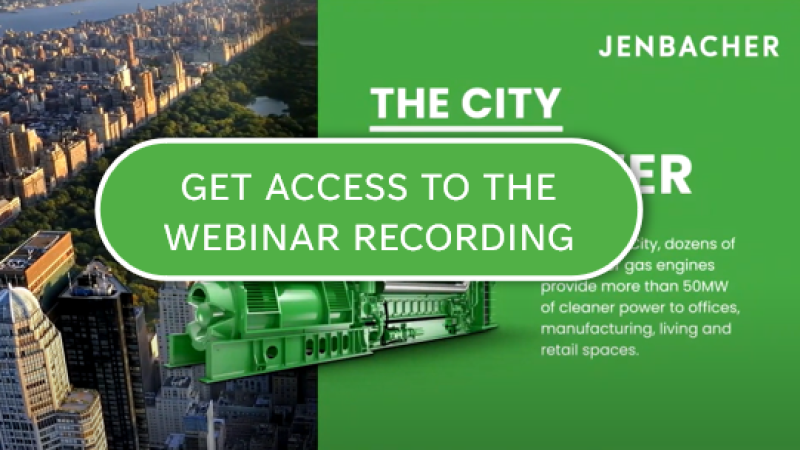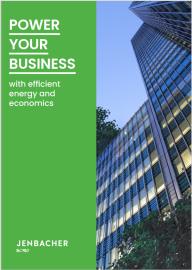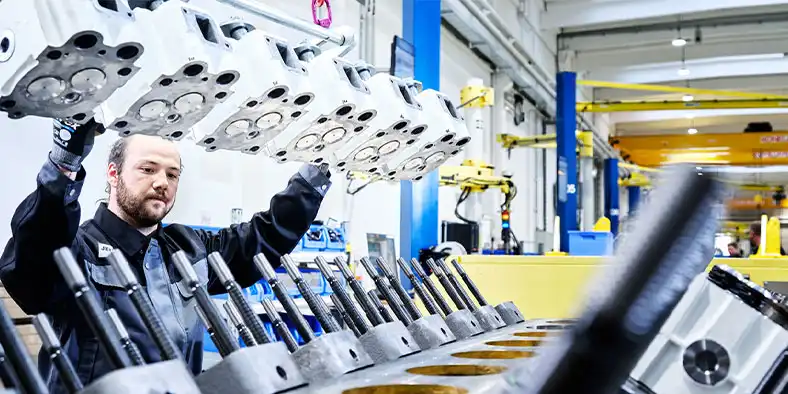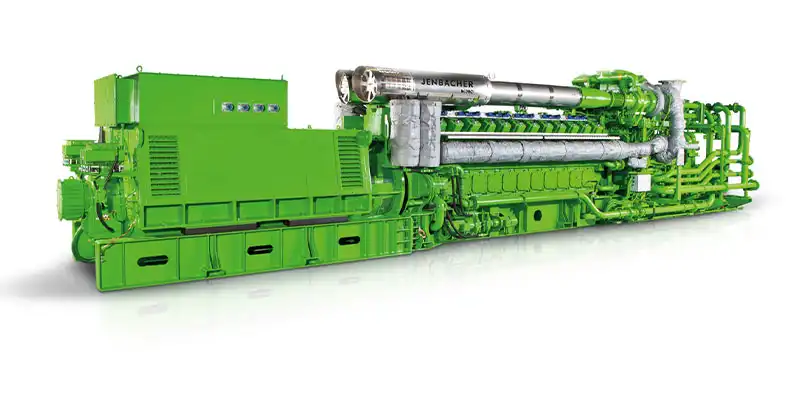Automotive Manufacturing
Power generation and combined heat and power solutions.
In the automotive industry, reliability, simple operation, high efficiency levels and low emissions are all critical aspects of energy conversion, not just for the end products that convert fuel to mobility, but also the supply chain that manufactures those products.
Our dedicated Jenbacher experts are available to provide personal consultation.
The automotive supply chain faces not only stringent regulations related to environment health and safety, but also intense competition and just-in time-logistics where vehicle production standstills can be costly.
Jenbacher offers onsite energy solutions, which can furnish the electricity required for complex manufacturing operations, and also improve space and process thermal energy, ultimately saving costs while reducing carbon intensity and other emissions associated with manufacturing and assembly processes. With rising energy costs, increasing demand charges from utilities, an aging central grid, and a worldwide focus on sustainability, Jenbacher gas engines just make sense for the auto industry.
Benefits of CHP for automotive industry

Save more with cogeneration in automobile manufacturing
Combined Heat and Power (CHP), or cogeneration, dependably generates onsite electric power while capturing thermal energy from the combustion of renewable and fossil fuels and applies it towards thermal processes like heating and chilling. This makes CHP applications in the automotive industry a much more efficient process than dual-source heat and power generation, where most of the thermal energy produced is simply lost through the stacks of large power plants. Further, some electrical energy is lost through the transmission and distribution of that energy across long distances. For these reasons, globally, nearly two-thirds of all the fuel used in power generation is wasted. Fuel efficiency means energy cost savings. And if you have financing, we can provide cogeneration for car production that removes both the CAPEX and payback period hurdles by matching energy savings to payment terms – meaning you can be cash flow positive on day one!
Stay up and running and saving money—on your schedule
CHP power plants can provide both the necessary electricity output and heat in an overall island operation as part of a microgrid that helps ensure business continuity and resiliency. This means that if the electric grid is lost due to a major storm, cyberattack, or other unforeseen event, the onsite power system can isolate itself from the grid and continue to provide power to critical facilities and processes.
Additionally, by operating during times of peak demand, CHP offers a demand charge offset. In markets where demand charges can be as much as 50%, it’s an easy way to keep your bottom line healthy.
Environmental benefits of combined heat and power
CHP is a critical carbon reduction strategy in a world where energy requirements will grow by 44% within the next 20 years –and greenhouse gas emissions need to be cut to drastically limit significant rise in global temperatures, according to a consensus of global scientists.
The automotive industry is continuing its efforts to minimize its CO2 emissions: both relating to the specific CO2 emissions from vehicles as well as the aim of turning production centers into zero emission locations through low energy construction methods and modern energy solutions. Due to their low emissions and high efficiency levels derived from the combined production of electricity and heat, Jenbacher gas engines are already making a sizeable contribution to a reduction in the ecological footprint of the automotive industry.
The flexibility to work with you
Additionally, Jenbacher gas engines in the automobile industry can run on almost any gaseous fuel. Besides operating at top efficiency on natural gas, they can generate power while safely disposing of environmentally harmful gases from landfill, agricultural, coal mining, chemical processing, and other industrial applications. Landfill gas and biogas from agricultural and water treatment digestion are renewable energy sources that can be developed as part of a corporate strategy while also combining the efficiency benefits of CHP.
The advantages of Jenbacher gas engines for car manufacturing are clear: Due to a Jenbacher engine’s flexibility, the solutions can be adapted to specific construction conditions and to specific customer needs. In addition, Jenbacher gas engines can be integrated directly into the existing plant capacity. Best of all, INNIO and its product partners are experienced at project management and lifecycle service solutions, to ensure there is never a loss of critical power to the facility.
Experience our webinar: Learn about our CHP solutions
Jenbacher North American team invites you to review the recording of our recent webinar, to learn how Jenbacher can help you develop your power plant projects, including equipment design and performance, using hydrogen and much more! In the webinar, you will learn more about:
- Overview of an independent power plant and its components
- Jenbacher’s highly efficient type 6 genset
- Our hydrogen power generation solutions
- How proven equipment design improves performance
- Power generation solutions with quick delivery and easy installation
The information provided is relevant for the North American market. Please reach out to our experts to discuss your project.
CHP Solutions
Jenbacher cogeneration (CHP) solutions are designed to generate both heat and power increasing overall power plant efficiency up to 90% and even more.
Case Studies
Automotive Manufacturer—Ann Arbor, Michigan, USA
When this leading auto company decided to expand their research and development facility, they had to make a choice. Wait two to three years for the substation to be built, or self-generate power? With the cost of a Jenbacher CHP power plant being less than a substation, the choice was clear. The company purchased the two Jenbacher engines in October 2016.
The auto manufacturer had requested the ability to use the engines in a blackout situation, and were also concerned about noise emitting from the units as they operate around the clock. INNIO and its channel partner Clarke Energy prioritized both aspects in the product selection, design, and project construction. As a result, two INNIO containerized J416 units were selected, both designed and built by INNIO. Each unit is rated at 1,141 kWe at full load producing power at 480 Volts. They can each also provide 194°F hot water for the future plant CHP interconnection at 4,524 MBtu/hr to offset space heating needs for the facility, which would otherwise require firing a boiler or consuming additional electricity. The system can black start during a grid outage and allow significant portions of the facility to continue operating in island mode during a prolonged grid outage. The containerized packaged solution also features sound attenuation that met the site’s needs.
Magna Polycon—Guelph, Ontario, Canada
In December 2015, Magna Polycon’s 8MW cogeneration plant went into operation and became an example of the application of CHP for vehicle manufacturing. In their 700,000 square-foot facility, Magna manufactures various automotive parts including plastic fascias, bumpers, and other shock absorbing components. The decision to build a CHP plant was done for a number of reasons—to stay competitive in the automotive industry and to lower their electricity costs.
The new plant was able to help Magna achieve 100% waste heat recovery utilization with steam production that is used for expanding polypropylene in their production process. The steam is available nearly instantaneously to their demand, which smooths the steam loads on the boilers and offsets fuel that would be otherwise consumed in the boilers. It also improves plant productivity since they don’t have to wait for the lag time of boilers ramping up and down to create the steam they need. Thanks in part to a 40% incentive grant from the Ontario government, and in conjunction with the 8MW electricity offset, Magna received a great return on investment.
For more information on the benefits of cogeneration in the automotive industry, contact us today.
Posco—Altamira, Mexico
Mexico’s largest steel galvanizing plant, owned by POSCO-Mexico, was able to save $6 million per year in electrical power costs and achieve power independence by using INNIO’s Jenbacher technology. The new nine-megawatt power generation project will use natural gas to produce POSCO-Mexico’s onsite power instead of purchasing it from the grid.
The galvanized steel produced is shipped to the automotive industry in North and South America, which depends heavily on this type of steel for the production of many components used in car manufacturing. The power plant, located in Altamira, Mexico, features three of INNIO’s natural gas-fueled Jenbacher J620 gas engines, rated at three megawatts each.
Honda Motorcycle and Scooter India Private Limited—Manesar, Haryana, India
Facing soaring diesel fuel prices and intense competition in India’s two-wheeler sector, the Honda Motorcycle & Scooter India Private Limited (HMSI) factory in the state of Haryana installed two of INNIO’s natural gas-fired Jenbacher cogeneration units that use less expensive natural gas to generate four megawatts of reliable on-site power. HMSI installed the Jenbacher units to lower energy costs at the flagship Manesar factory as the company prepares to expand production in India. The Manesar facility manufactures about 1.6 million scooters and motorcycles annually, and HMSI aims to increase this capacity to 10 million two-wheelers annually by 2020.
HMSI originally installed a battery of 1-MW diesel generators to supply the factory’s power. However, to counter soaring diesel fuel prices, HMSI decided to replace four of the diesel generators with INNIO’s more efficient, natural gas-fueled Jenbacher J612 combined heat and power (CHP) units. HMSI’s cost of generating power by using the Jenbacher units (in waste-heat recovery mode) is an estimated Rs. 6.50/per unit compared to the previous diesel generator cost of about Rs. 12.00/per unit—a savings of about of Rs.5.50/per unit, or a 45.8% reduction.
Our experts are ready to help you!
Looking for onsite power solutions?
Need access to electricity? We’re there for you.
Want to lower your energy costs, or even sell electricity back to your local grid?
INNIO’s regional experts can help you figure out the Jenbacher solution that best meets your needs. With a free consultation, you can:
- Explore the advantages of onsite power generation solutions for your company
- Discover how to use economic modeling for added financial benefit
- Get answers on the technical aspects of your project—including fuel types, feasibility studies, and equipment and balance of plant selection
- Learn how to take advantage of regional incentive programs
- Review the delivery options for your project: purchasing, financing, leasing, and engaging a service provider, such as ESCO or BOO
- Find out how to meet emissions targets
Fill out the following contact form or send us an email to contact.en@innio.com. Let’s get started!
Consult an expert
Send us a message and we’ll contact you to start the conversation.
Whether your business is looking for onsite power solutions, access to electricity, decreased energy costs, or even to sell electricity back to your local grid/consumers, Jenbacher regional experts can advise you on which solution makes the most sense for you.




